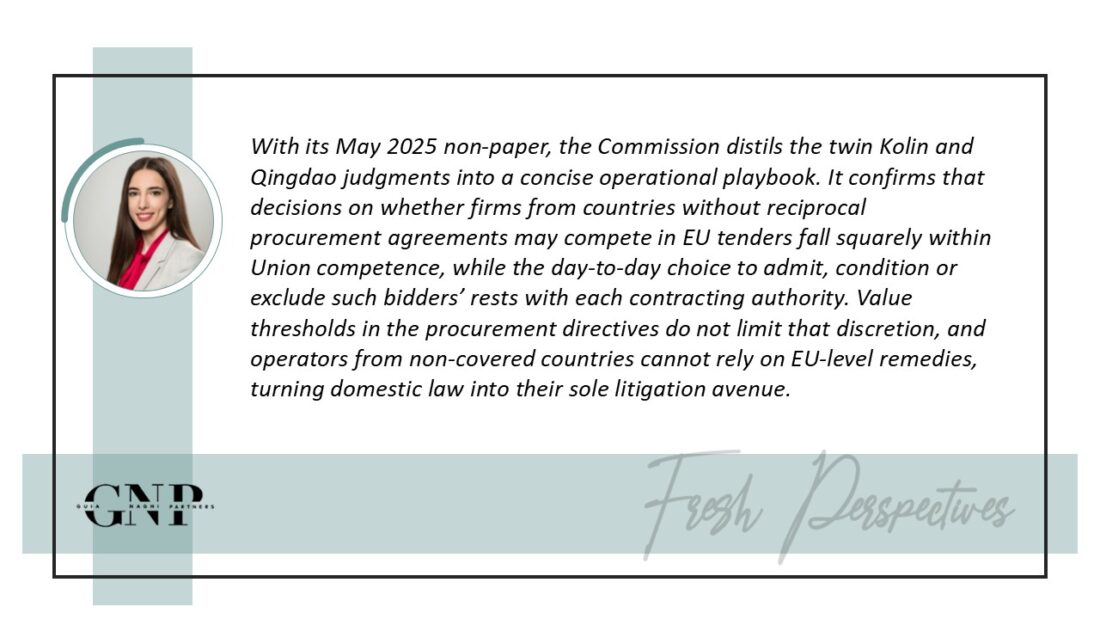Dana-Teodora Marin – Passport required: Decoding the Commission’s Post-Kolin procurement guidelines
On 21st of May 2025, the Commission services published a nine-page “non-paper” in response to questions raised after the judgments of the Court of Justice in Kolin (C-652/22, 22 October 2024) and Qingdao (C-266/22, 13 March 2025). The paper explains how contracting authorities should treat economic operators established in third countries that are not linked to the Union by an international public-procurement agreement (“non-covered countries”) and clarifies the limits of Member-State action following the Court’s confirmation that access by such operators falls within the Union’s exclusive common-commercial-policy competence.
1. Definition of non-covered Countries and the coverage test
The non-paper reiterates the Court’s terminology: a non-covered country is a state that “has not concluded an international agreement with the European Union which guarantees access to public procurement in a reciprocal and equal manner.” Contracting authorities must grant non-discriminatory access only to operators from countries that benefit from the Union’s commitments under the WTO Government Procurement Agreement (GPA) or bilateral free-trade instruments; in every other instance the authority remains free to decide whether admission is granted.
Separately, in what regards covered tender procedures, under the coverage test described in the document, a contract is “covered” only if all of the following conditions are met: (i) the entity is listed in the relevant agreement, (ii) the goods, services or works are listed, and (iii) the estimated value exceeds the agreement-specific threshold. Where any element is absent, discretion arises.
2. Absence of monetary thresholds
The Commission stresses that the Kolin principles are anchored in the Union’s common commercial policy, whose exercise is not tied to the value thresholds that delimit the scope of the classical and utilities directives. Consequently, the discretion to admit or exclude operators from non-covered countries applies irrespective of contract value and without any need to establish cross-border interest.
3.Treatment of goods of non-covered origin
The non-paper distinguishes between the nationality of economic operators and the origin of goods. While Kolin addressed only operators, Article 85 of Directive 2014/25/EU (Utilities) remains intact: a supply tender may be rejected if more than 50 % of the total product value originates in non-covered countries, and in cases of near-equivalence preference must be shown to tenders that cannot be rejected. The Commission confirms that this quantitative test is unaffected by the recent case-law.
4. Consortia, sub-contracting and reliance on external capacity
The Court did not pronounce on the position of non-covered entities acting as consortium members, sub-contractors or capacity providers. The non-paper therefore places responsibility squarely on each contracting authority, which may decide case-by-case whether such participation is acceptable. For the purpose of identifying origin, inspiration may be drawn from Article 3 of Regulation (EU) 2022/1031 on the International Procurement Instrument (IPI) and its 2023 guidelines.
5. Implications for national legislation
Any national provision that purports to regulate market access for operators from non-covered countries intrudes upon an area of exclusive Union competence. The non-paper states that such provisions must be amended and are pending amendment, inapplicable. In the interim, each contracting authority must exercise its own discretion within individual procedures, since Member-State authorities may not adopt acts of general application in this domain.
6. Decision-making parameters for contracting authorities
- Nature of the discretion. In the absence of Union legislation, a contracting authority may (a) refuse access, (b) grant access on conditions identical to those applied to EU or covered-country operators, or (c) grant access while applying an evaluation adjustment (e.g. price-loading or score weighting). The authority may operate ad hoc or follow an internal, non-binding policy.
- Evaluation adjustments. Where non-covered bidders are admitted, the authority may introduce a mechanism to neutralize perceived competitive imbalances. The non-paper notes that the second sub-paragraph of Article 6(8) IPI may serve as a model but does not prescribe any particular formula.
- Tender documentation. The authority may announce its position in the contract notice or keep the possibility of exclusion in reserve. Silence in the documents does not prevent a later decision to reject or accept a bid from a non-covered operator during the procedure.
7. Legal protection and remedies
Operators from non-covered countries do not acquire rights under Directives 89/665/EEC or 92/13/EEC, as those directives implement Union law that, according to the Court, does not extend to them. Any challenge they may pursue lies exclusively in national civil or administrative law that does not transpose the EU procurement acquis. Issues concerning Article 6 of the European Convention on Human Rights, if they arise, are therefore matters for national law alone.
CONCLUSION
The Commission’s non-paper crystalizes four principal consequences of the Kolin and Qingdao judgments. First, only the European Union, acting under its exclusive common commercial policy, may decide whether economic operators from countries that are not covered by an international procurement agreement can participate in public tenders within the Union. Second, unless and until the Union adopts specific legislation, each contracting authority retains complete discretion, unrelated to the value thresholds in the public-procurement directives, to admit, limit, or refuse such operators in any individual procedure. Third, Article 85 of Directive 2014/25/EU remains in force and permits rejection of supply tenders whose products derive more than half of their value from non-covered countries. Fourth, economic operators from non-covered countries enjoy no rights under the EU Remedies Directives, so any challenge to a contracting authority’s decision must rely solely on domestic legal avenues. Collectively, these elements create a transitional background in which the external boundary of the Union’s procurement market is managed at the level of each contracting authority, constrained only by national transparency requirements and the structural limits identified by the Court.





No Comments